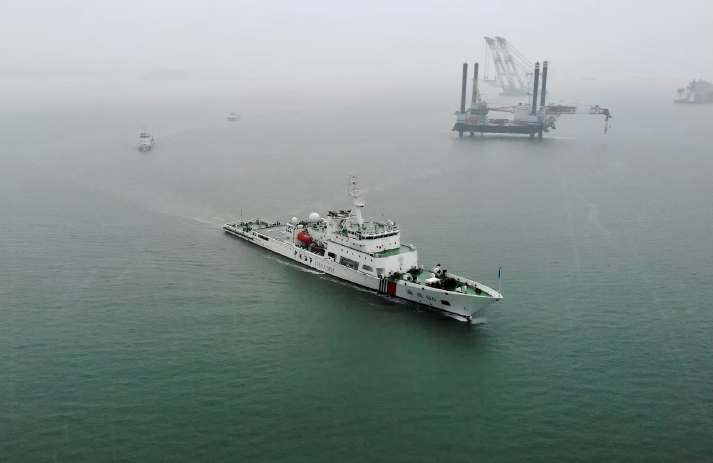| Voice |
| How the U.S. misuses 'Freedom of Navigation' | |
|
|
 A fleet led by the Haixun 06 patrol ship departs from Pingtan, Fujian Province, on April 5 for a patrol and inspection mission in the Taiwan Straits (CNSPHOTO)
Since the Joe Biden administration took office in January 2021, guided-missile destroyers of the U.S. Navy's Seventh Fleet, headquartered in Yokosuka, Japan, sailed through the Taiwan Straits 12 times in 2021 and seven times in 2022. In the first half of this year, the People's Liberation Army Eastern Theater Command tracked and monitored U.S. warships' transits through and a U.S. warplane's flights over the Taiwan Straits in January, February, April and June. At a time when cross-Straits relations are at a low point, with Taiwan leader Tsai Ing-wen's pursuit of "Taiwan independence," the frequent maneuvering of U.S. warships and reconnaissance planes there is highly provocative. It not only runs counter to the one-China policy that the U.S. Government has claimed it upholds, but also borders on a violation of international law. The 1982 United Nations Convention on the Law of the Sea (UNCLOS), the fundamental law establishing rules for international waters, defines important concepts such as internal waters, territorial seas, exclusive economic zones (EEZs) and high seas. The breadth of the territorial sea, the contiguous zone and the EEZ is measured from the territorial sea baseline, with the territorial sea extending 12 nautical miles from the baseline and the contiguous zone extending another 12 nautical miles. The EEZ is the area beyond the territorial sea extending 200 nautical miles from the baseline. The Taiwan Straits lie between the Chinese island of Taiwan and the coast of Fujian Province on the Chinese mainland. Given that the straits are less than 200 nautical miles wide, there are no "international waters" in the Taiwan Straits. China has the right to stop and punish violations of its customs, health, fiscal and immigration regulations in the territorial sea and the contiguous zone. In addition, it has the right to manage resources and the environment in the EEZ. Taiwan has always been part of China's territory. By the time the People's Republic of China was founded in 1949, the defeated Kuomintang regime had retreated to the island, creating division between the two sides of the Taiwan Straits. The Central Government has proposed the One Country, Two Systems principle, under which Taiwan will retain its own social and economic systems upon peaceful reunification. While recognizing the sovereignty of coastal states over the territorial sea and the right to administer the EEZ, international law codifies the right of innocent passage. China's law on the EEZ also states that all countries shall enjoy the freedom of navigation in and over China's EEZ, provided that they comply with international law and China's laws and regulations. The UNCLOS states: "Passage is innocent so long as it is not prejudicial to the peace, good order or security of the coastal state." Article 19 (2) of the UNCLOS provides a list of 12 activities in the territorial sea that are considered prejudicial to the peace, good order or security of the coastal state. These include any threat or use of force against the sovereignty, territorial integrity or political independence of the coastal state, or in any other manner in violation of the principles of international law embodied in the Charter of the United Nations. Also, Article 39 says ships and aircraft, while exercising the right of transit passage through straits, shall refrain from "any threat or use of force against the sovereignty, territorial integrity or political independence of states bordering the strait." Sending American warships through the Taiwan Straits is mainly for political purposes. This flaunting of military force can embolden those advocating "Taiwan independence" and is therefore detrimental to cross-Straits relations and regional peace and stability. Also, the U.S. warships have sailed close to China's territorial waters on many occasions, constituting a military provocation. China has no objection to the right of passage of other countries' ships and aircraft through the Taiwan Straits. What China does object to is that a small number of countries, led by the U.S., interfere in China's internal affairs in the name of "freedom of navigation" and by doing so undermine the one-China principle. The author is a professor at the School of Law under the Beijing Institute of Technology Copyedited by Elsbeth van Paridon Comments to taoxing@cicgamericas.com |
|
||||||||||||||||||||||||||||||
|